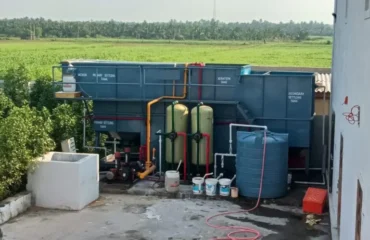Introduction
Nagpur, a key industrial hub in Maharashtra, is also home to a significant plastic recycling industry. As the industry grows, so does the generation of wastewater laden with contaminants. Managing this wastewater is crucial to ensure environmental sustainability and regulatory compliance. Amrita Water Solution offers specialized Effluent Treatment Plants (ETP) designed for the waste plastic recycling industry in Nagpur. This article explores the importance, components, and benefits of ETP systems for plastic recycling, highlighting their role in promoting sustainable industrial practices.
Importance of Wastewater Treatment in Plastic Recycling
Environmental Protection
Wastewater from plastic recycling processes can contain hazardous chemicals and microplastics. Treating this wastewater is essential to prevent environmental pollution and protect local ecosystems and water resources.
Regulatory Compliance
Strict environmental regulations govern the discharge of industrial wastewater. Effective ETP systems help plastic recycling companies in Nagpur comply with these regulations, avoiding fines and legal issues.
Resource Recovery
Advanced ETP systems enable the recovery of valuable resources from wastewater, such as reusable water, reducing the overall environmental footprint and operational costs.
Components of an ETP Plant
Primary Treatment
- Screening: Removal of large debris and solids from the wastewater to prevent damage to subsequent treatment units.
- Sedimentation: Allowing suspended solids to settle out of the water by gravity.
Secondary Treatment
- Chemical Treatment: Use of chemicals to precipitate contaminants and neutralize harmful substances.
- Biological Treatment: Employing microorganisms to biologically degrade organic pollutants in the wastewater.
Tertiary Treatment
- Filtration: Advanced filtration methods to remove fine particles and residual contaminants.
- Disinfection: Application of disinfectants to eliminate pathogenic microorganisms, ensuring the treated water is safe for discharge or reuse.
Benefits of ETP for Plastic Recycling Industries
Environmental Safety
Proper treatment of wastewater reduces the risk of environmental contamination, safeguarding water bodies and surrounding ecosystems.
Regulatory Compliance
Effective ETP systems ensure compliance with local and national wastewater discharge standards, helping companies avoid regulatory penalties.
Cost Efficiency
ETP systems reduce the need for fresh water by enabling the reuse of treated water, cutting operational costs and enhancing resource efficiency.
Corporate Social Responsibility
Investing in advanced wastewater treatment solutions demonstrates a commitment to environmental sustainability, enhancing a company’s reputation and stakeholder trust.
Challenges and Solutions
High Initial Costs
Solution: Utilizing government incentives and subsidies, along with flexible financing options, can help mitigate the high initial costs of implementing ETP systems.
Technical Expertise
Solution: Providing comprehensive training programs and continuous technical support ensures the efficient operation and maintenance of ETP systems.
Space Constraints
Solution: Designing compact and modular ETP systems that fit into the available industrial space without compromising on efficiency or capacity.
Conclusion
Effluent Treatment Plants (ETP) are vital for the sustainable operation of the waste plastic recycling industry in Nagpur. Amrita Water Solution delivers cutting-edge ETP systems tailored to the specific needs of plastic recycling, ensuring environmental protection, regulatory compliance, and cost efficiency. By adopting advanced wastewater treatment solutions, plastic recycling companies in Nagpur can significantly reduce their environmental impact and contribute to a more sustainable future.


